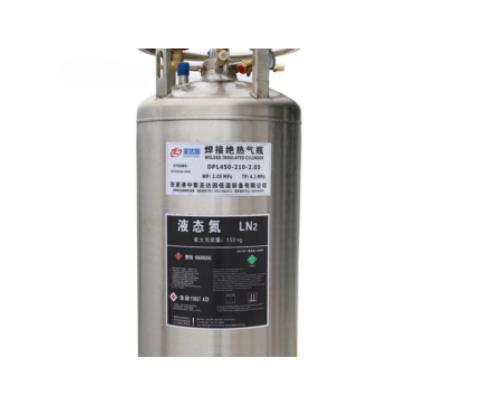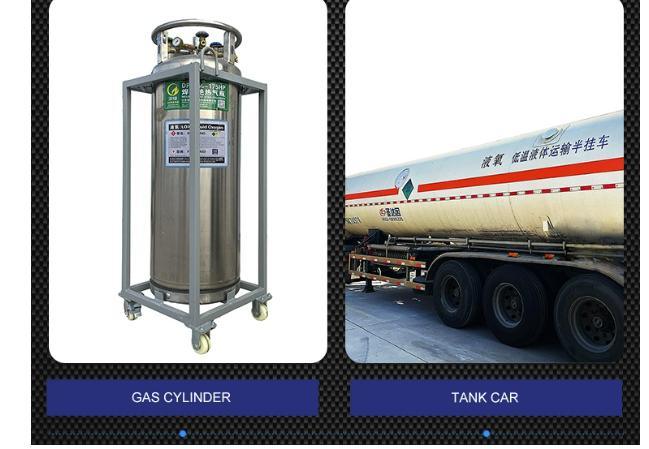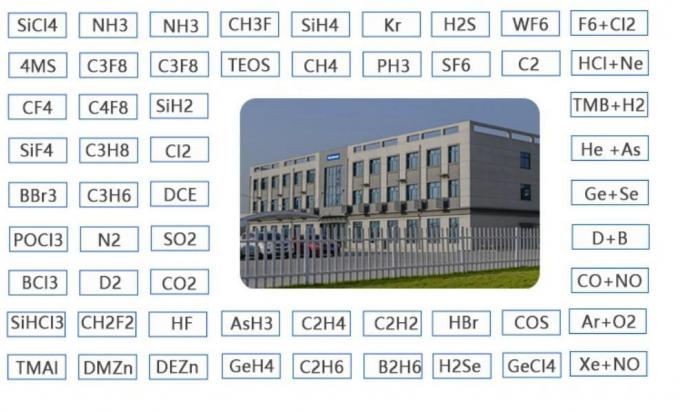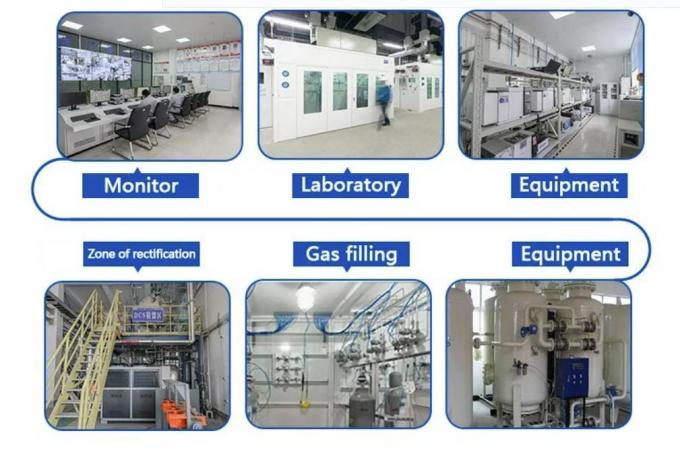


| MOQ: | 1kg |
| Price: | US $110/kg |
| Standard Packaging: | Cylinder/Tank |
| Delivery Period: | 15 days |
| Payment Method: | L/C, T/T |
| Supply Capacity: | 5000kg/month |
Liquid argon (Ar) is the cryogenic liquid form of the noble gas argon. It is obtained through the cooling and condensation of gaseous argon at very low temperatures. Here are some key points about liquid argon:
Physical Properties: Liquid argon has several important physical properties:
Boiling Point: Argon has a boiling point of -185.9 degrees Celsius (-302.6 degrees Fahrenheit) at atmospheric pressure. It transitions from a gas to a liquid state at this temperature.
Density: Liquid argon is significantly denser than its gaseous form. It has a density of approximately 1.4 grams per cubic centimeter, making it heavier than air.
Color and Appearance: Liquid argon is colorless and has a transparent appearance similar to water.
Cryogenic Nature: Liquid argon is considered a cryogenic liquid, meaning it is extremely cold and can cause severe frostbite or injury upon direct contact with living tissue.
Production and Storage: Liquid argon is typically produced through a process called cryogenic distillation, where atmospheric air is cooled and separated into its constituent components. Argon, which comprises about 0.94% of the Earth's atmosphere, is then isolated and liquefied at very low temperatures.
Uses and Applications: Liquid argon has various applications in different fields:
Research and Scientific Experiments: Liquid argon is used as a cryogenic medium in scientific research, particularly in experiments involving particle physics and neutrino detection. It serves as a target material for neutrino interactions and as a scintillation medium in particle detectors.
Welding and Metal Fabrication: Liquid argon is utilized in certain welding processes, such as tungsten inert gas (TIG) welding and metal fabrication. It acts as a shielding gas to protect the weld area from atmospheric contamination and oxidation.
Cooling and Cryopreservation: Liquid argon is employed in cryogenic cooling applications, such as the cooling of superconducting magnets in various scientific and medical devices. It is also used for cryopreservation, where biological materials, such as sperm, eggs, and tissues, are preserved at extremely low temperatures for long-term storage.
Food and Beverage Industry: Liquid argon is sometimes used in the food and beverage industry to freeze and preserve food products, such as ice cream or frozen fruits.
Semiconductor Manufacturing: Argon is used in the production of semiconductors and integrated circuits as a high-purity inert gas for various manufacturing processes, including plasma etching and sputter deposition.
Lighting and Lasers: Argon is employed in some types of lighting, such as gas discharge lamps, and as a lasing medium in certain types of lasers, such as argon ion lasers.
Safety Considerations: Liquid argon requires careful handling and storage due to its cryogenic nature and potential hazards:
Cold Burns: Direct contact with liquid argon can cause severe frostbite and burns. Protective gloves and equipment should be used when handling it.
Oxygen Displacement: Liquid argon can displace oxygen in confined spaces, leading to an oxygen-deficient atmosphere. Adequate ventilation and monitoring are necessary to prevent asphyxiation hazards.
Pressure Hazards: When heated or allowed to evaporate rapidly, liquid argon can generate a large volume of gaseous argon, resulting in an increase in pressure. This can lead to container rupture or explosion if not properly controlled.
Incompatible Materials: Liquid argon can react with certain materials, including some metals and organic compounds, which may pose safety risks. Compatibility considerations should be taken into account when selecting materials for storage and handling equipment.
Proper training, adherence to safety protocols, and familiarity with the specific hazards associated with liquid argon are essential to ensure safe handling and use in various applications.
Liquid oxygen is the liquid form of elemental oxygen (O2) at extremely cold temperatures. Oxygen normally exists as a gas at room temperature and atmospheric pressure, but when it is cooled below its boiling point of -183 degrees Celsius (-297 degrees Fahrenheit), it condenses into a pale blue liquid.
Liquid oxygen is highly reactive and supports combustion, making it an essential component in many industrial and medical applications. Here are a few key points about liquid oxygen:
Industrial Applications: Liquid oxygen is widely used in various industries. It is employed in the production of steel, as it enhances the efficiency of the steelmaking process. It is also used as an oxidizer in rocket engines, providing the necessary oxygen for the combustion of rocket propellants.
Medical Applications: In the medical field, liquid oxygen is used for oxygen therapy. It is stored in specially designed containers and used to provide supplemental oxygen to patients with respiratory conditions or those in need of increased oxygen levels.
Cryogenics: Liquid oxygen is utilized as an oxidizer in cryogenic applications. It is used in combination with liquid hydrogen as rocket propellant for space exploration. It is also employed in cryogenic engines and systems that require extremely low temperatures.
Storage and Handling: Liquid oxygen needs to be stored and handled with great care due to its reactivity and potential for combustion. It is usually stored in well-insulated containers, such as cryogenic tanks, which can maintain the extremely low temperatures required to keep it in a liquid state.
Safety Precautions: Liquid oxygen is highly reactive and can support combustion, making it a potential fire hazard. It can react violently with flammable materials or fuels, causing explosions. Proper safety measures, such as storing it away from flammable substances and avoiding contact with organic materials, are essential when dealing with liquid oxygen.
It's important to note that handling and working with liquid oxygen should only be done by trained professionals who are knowledgeable about its properties and safety precautions.
Basic Info.
| Model NO. | o2 | Pressure | 12.5MPa |
| Industrial Grade | Industrial Grade | Cylinder | 175L |
| Purity | 99.50% | Transport Package | Sea Transportation |
| Specification | 175L 99.5% | Trademark | CMC |
| Origin | Suzhou | Production Capacity | 5000piece/Month |


| Product Name | Liquid Oxygen |
| Molecular Formula | LOX |
| Einecs No. | 231-956-9 |
| Place Of Origin | Suzhou, China |
| Purity | 99.50% |
| Grade | Electron Grade, Industrial Grade |
| Hazard Class | 2.2 |
| Molecular Weight | 32 |
| Un | 1072 |
| Boiling Point(ºC) | ( -182.96 °C) |
| Packing Method | Gas Cylinder |
| Packing Detail | TTank Car:22m³ Content:25tons |

ShangHai CMC chemical Co.,ltd. is staffed by trained personnel, combine many years experience in Gas industry .We supply cylinder gas, electronic gas, etc ., and the gas holder, panel, valves and fittings and other equipment, parts and engineering services to our customers in China and worldwide; The products are involved in various industrial fields, such as semiconductor chip, solar cell, LED, TFT-LCD, optical fiber, glass, laser, medicine , etc., Our mission is to partner with our global customers to provide support, solutions and quality products that are innovative,reliable, and safe.
Our products mainly include: H2, O2, N2, Ar, CO2, propane, acetylene, helium, laser mixed gas, SiH4, Sih2cl2, SiHCL3, SiCL4, NH3, CF4, NF3, SF6, HCL, N2O, doping mixed gas (TMB, PH3, B2H6) and other electronic gases.



Q: What is the min order?
A: Different products have different min orders. It depends on the kind the gas and the cylinder specifications. Please feel free to contact me directly for your requirement.
Q: What is the package & storage details?
A: Seamless steel cylinder with different valves, or as to your requirement.
Stored in the shady, cool, dry, ventilated warehouse, and keep away from sunlight and ramming.
Q: Shall we send back the cylinders to China to refill the gas again?
A: Yes, when you ordered our cylinders, next time, you can send back the cylinders to fill gas again. You just need to tell us before you export. We will handle all the import customs clearance formalities.
Q: What are your company's main sales products?
A: We mainly supply electronics specialty gas and mixtures needed by the electronics industry, such as NH3, SiH4, C4F8, O2, CF4, CO2, TEOS, etc.
Q: How to ensure the quality of your products?
A: We have passed the ISO 9001:2015 quality management system certification and ISO 14001:2015 environmental management system certification.
Q: How do you ship the product?
A: Usually we ship products by ocean shipping
Q: What is your advantage over other competitors?
A: We are a factory with excellent equipment and a high-quality control system, and our factory price is more competitive, fast shipment with high quality.
We have a full-time after-sales service providing solutions to various problems. After-sales service engineers standby 24 hours a day, and respond to customer needs when necessary at the first time.

| MOQ: | 1kg |
| Price: | US $110/kg |
| Standard Packaging: | Cylinder/Tank |
| Delivery Period: | 15 days |
| Payment Method: | L/C, T/T |
| Supply Capacity: | 5000kg/month |
Liquid argon (Ar) is the cryogenic liquid form of the noble gas argon. It is obtained through the cooling and condensation of gaseous argon at very low temperatures. Here are some key points about liquid argon:
Physical Properties: Liquid argon has several important physical properties:
Boiling Point: Argon has a boiling point of -185.9 degrees Celsius (-302.6 degrees Fahrenheit) at atmospheric pressure. It transitions from a gas to a liquid state at this temperature.
Density: Liquid argon is significantly denser than its gaseous form. It has a density of approximately 1.4 grams per cubic centimeter, making it heavier than air.
Color and Appearance: Liquid argon is colorless and has a transparent appearance similar to water.
Cryogenic Nature: Liquid argon is considered a cryogenic liquid, meaning it is extremely cold and can cause severe frostbite or injury upon direct contact with living tissue.
Production and Storage: Liquid argon is typically produced through a process called cryogenic distillation, where atmospheric air is cooled and separated into its constituent components. Argon, which comprises about 0.94% of the Earth's atmosphere, is then isolated and liquefied at very low temperatures.
Uses and Applications: Liquid argon has various applications in different fields:
Research and Scientific Experiments: Liquid argon is used as a cryogenic medium in scientific research, particularly in experiments involving particle physics and neutrino detection. It serves as a target material for neutrino interactions and as a scintillation medium in particle detectors.
Welding and Metal Fabrication: Liquid argon is utilized in certain welding processes, such as tungsten inert gas (TIG) welding and metal fabrication. It acts as a shielding gas to protect the weld area from atmospheric contamination and oxidation.
Cooling and Cryopreservation: Liquid argon is employed in cryogenic cooling applications, such as the cooling of superconducting magnets in various scientific and medical devices. It is also used for cryopreservation, where biological materials, such as sperm, eggs, and tissues, are preserved at extremely low temperatures for long-term storage.
Food and Beverage Industry: Liquid argon is sometimes used in the food and beverage industry to freeze and preserve food products, such as ice cream or frozen fruits.
Semiconductor Manufacturing: Argon is used in the production of semiconductors and integrated circuits as a high-purity inert gas for various manufacturing processes, including plasma etching and sputter deposition.
Lighting and Lasers: Argon is employed in some types of lighting, such as gas discharge lamps, and as a lasing medium in certain types of lasers, such as argon ion lasers.
Safety Considerations: Liquid argon requires careful handling and storage due to its cryogenic nature and potential hazards:
Cold Burns: Direct contact with liquid argon can cause severe frostbite and burns. Protective gloves and equipment should be used when handling it.
Oxygen Displacement: Liquid argon can displace oxygen in confined spaces, leading to an oxygen-deficient atmosphere. Adequate ventilation and monitoring are necessary to prevent asphyxiation hazards.
Pressure Hazards: When heated or allowed to evaporate rapidly, liquid argon can generate a large volume of gaseous argon, resulting in an increase in pressure. This can lead to container rupture or explosion if not properly controlled.
Incompatible Materials: Liquid argon can react with certain materials, including some metals and organic compounds, which may pose safety risks. Compatibility considerations should be taken into account when selecting materials for storage and handling equipment.
Proper training, adherence to safety protocols, and familiarity with the specific hazards associated with liquid argon are essential to ensure safe handling and use in various applications.
Liquid oxygen is the liquid form of elemental oxygen (O2) at extremely cold temperatures. Oxygen normally exists as a gas at room temperature and atmospheric pressure, but when it is cooled below its boiling point of -183 degrees Celsius (-297 degrees Fahrenheit), it condenses into a pale blue liquid.
Liquid oxygen is highly reactive and supports combustion, making it an essential component in many industrial and medical applications. Here are a few key points about liquid oxygen:
Industrial Applications: Liquid oxygen is widely used in various industries. It is employed in the production of steel, as it enhances the efficiency of the steelmaking process. It is also used as an oxidizer in rocket engines, providing the necessary oxygen for the combustion of rocket propellants.
Medical Applications: In the medical field, liquid oxygen is used for oxygen therapy. It is stored in specially designed containers and used to provide supplemental oxygen to patients with respiratory conditions or those in need of increased oxygen levels.
Cryogenics: Liquid oxygen is utilized as an oxidizer in cryogenic applications. It is used in combination with liquid hydrogen as rocket propellant for space exploration. It is also employed in cryogenic engines and systems that require extremely low temperatures.
Storage and Handling: Liquid oxygen needs to be stored and handled with great care due to its reactivity and potential for combustion. It is usually stored in well-insulated containers, such as cryogenic tanks, which can maintain the extremely low temperatures required to keep it in a liquid state.
Safety Precautions: Liquid oxygen is highly reactive and can support combustion, making it a potential fire hazard. It can react violently with flammable materials or fuels, causing explosions. Proper safety measures, such as storing it away from flammable substances and avoiding contact with organic materials, are essential when dealing with liquid oxygen.
It's important to note that handling and working with liquid oxygen should only be done by trained professionals who are knowledgeable about its properties and safety precautions.
Basic Info.
| Model NO. | o2 | Pressure | 12.5MPa |
| Industrial Grade | Industrial Grade | Cylinder | 175L |
| Purity | 99.50% | Transport Package | Sea Transportation |
| Specification | 175L 99.5% | Trademark | CMC |
| Origin | Suzhou | Production Capacity | 5000piece/Month |


| Product Name | Liquid Oxygen |
| Molecular Formula | LOX |
| Einecs No. | 231-956-9 |
| Place Of Origin | Suzhou, China |
| Purity | 99.50% |
| Grade | Electron Grade, Industrial Grade |
| Hazard Class | 2.2 |
| Molecular Weight | 32 |
| Un | 1072 |
| Boiling Point(ºC) | ( -182.96 °C) |
| Packing Method | Gas Cylinder |
| Packing Detail | TTank Car:22m³ Content:25tons |

ShangHai CMC chemical Co.,ltd. is staffed by trained personnel, combine many years experience in Gas industry .We supply cylinder gas, electronic gas, etc ., and the gas holder, panel, valves and fittings and other equipment, parts and engineering services to our customers in China and worldwide; The products are involved in various industrial fields, such as semiconductor chip, solar cell, LED, TFT-LCD, optical fiber, glass, laser, medicine , etc., Our mission is to partner with our global customers to provide support, solutions and quality products that are innovative,reliable, and safe.
Our products mainly include: H2, O2, N2, Ar, CO2, propane, acetylene, helium, laser mixed gas, SiH4, Sih2cl2, SiHCL3, SiCL4, NH3, CF4, NF3, SF6, HCL, N2O, doping mixed gas (TMB, PH3, B2H6) and other electronic gases.



Q: What is the min order?
A: Different products have different min orders. It depends on the kind the gas and the cylinder specifications. Please feel free to contact me directly for your requirement.
Q: What is the package & storage details?
A: Seamless steel cylinder with different valves, or as to your requirement.
Stored in the shady, cool, dry, ventilated warehouse, and keep away from sunlight and ramming.
Q: Shall we send back the cylinders to China to refill the gas again?
A: Yes, when you ordered our cylinders, next time, you can send back the cylinders to fill gas again. You just need to tell us before you export. We will handle all the import customs clearance formalities.
Q: What are your company's main sales products?
A: We mainly supply electronics specialty gas and mixtures needed by the electronics industry, such as NH3, SiH4, C4F8, O2, CF4, CO2, TEOS, etc.
Q: How to ensure the quality of your products?
A: We have passed the ISO 9001:2015 quality management system certification and ISO 14001:2015 environmental management system certification.
Q: How do you ship the product?
A: Usually we ship products by ocean shipping
Q: What is your advantage over other competitors?
A: We are a factory with excellent equipment and a high-quality control system, and our factory price is more competitive, fast shipment with high quality.
We have a full-time after-sales service providing solutions to various problems. After-sales service engineers standby 24 hours a day, and respond to customer needs when necessary at the first time.